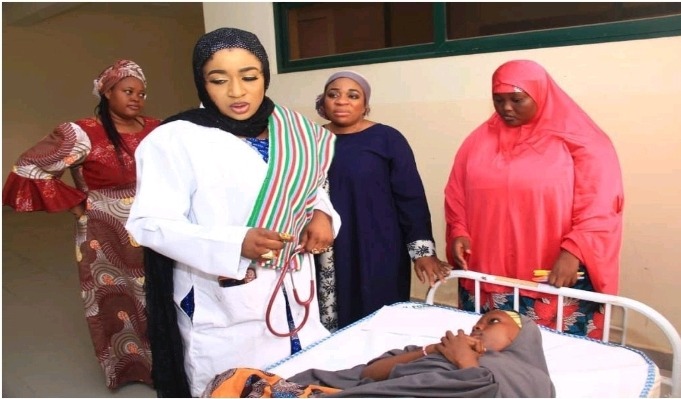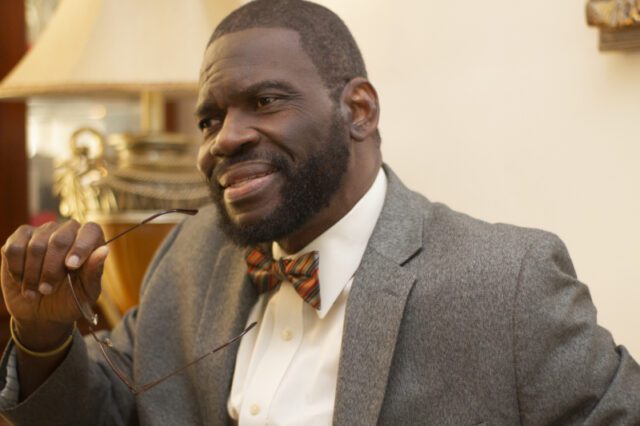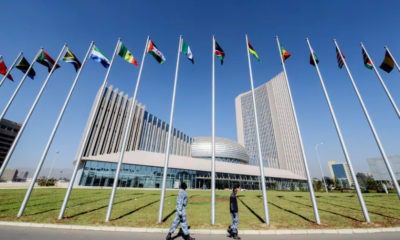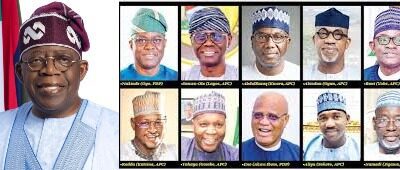National Issues
A Sympathetic Appeal for Ethical Leadership: Dr. Betta Edu’s Path Forward -By John Egbeazien Oshodi
Let us forge a path forward together, resolute in our commitment to ensuring that public funds are managed with unparalleled transparency and unimpeachable accountability. This journey will not only restore faith in our government but also serve as an indomitable testament to our dedication to the welfare of the people we represent.

Dear Minister Dr. Betta Edu,
I write openly to engage in a profound conversation that transcends the surface of recent events. This is an exploration of the psychological and ethical dimensions of the challenges you have faced, challenges that have not only thrust you into the public spotlight but have also ignited discussions about the responsible management of public funds.
In these trying times, it is crucial to recognize the human aspect of leadership. We all possess aspirations, dreams, and a moral compass. This is not about casting blame or passing judgment; it’s about delving into the depths of human behavior, ethics, and the choices we make. It’s about understanding the psyche behind actions and fostering growth, not just for you but for our nation and humanity at large.
Your journey into the realm of politics has been nothing short of remarkable. Starting from the trenches of healthcare, where you served as a dedicated medical doctor, to the corridors of power as the Minister of Humanitarian Affairs and Poverty Alleviation, your path reflects dedication, ambition, and a profound commitment to serving your country. Your journey is a testament to the power of resilience and the unwavering pursuit of excellence.
During the presidential campaign, your words resonated with sincerity and compassion as a healthcare professional deeply concerned about the welfare of the poor and women. When appointed to your current role, many, including myself, were genuinely pleased to see someone with a healthcare background taking charge of such an important ministry.
Your swift ascent through various roles, including Special Adviser, Director General of Cross River State Primary Health Care Development Agency, Commissioner for Health in the State, and Chairman of CRS COVID-19 task force, showcases your hard work, focus, humility, and unwavering trust in God. Your contributions to the development of your country have not gone unnoticed.
As the first female Minister from Cross River, you have shattered barriers and paved the way for more female involvement in politics within your state. Your track record of achievements precedes you, and your capacity to deliver is beyond question. You are a goal-oriented individual with a positive mindset, consistently demonstrating that excuses and impossibilities do not exist in your dictionary.
However, let us momentarily set emotions aside to address the recent concerns regarding the transfer of public funds into a private account. Irrespective of perspective, the term “private account” carries an air of suspicion and unease. I must admit, it even has a somewhat comical ring to it – the idea of a private, personal bank account of the project manager serving as the repository for public funds, whether salary or New Year bonuses, has evoked a myriad of emotions. In fact, I cried.
The public trust that you carry as a leader demands nothing less than complete transparency and ethical conduct. The recent media reports have raised significant ethical and policy concerns regarding the disbursement of funds to Oniyelu Bridget Mojisola for vulnerable groups in Akwa Ibom, Cross River, Ogun, and Lagos States. Your media assistant, Rasheed Zubair, stated that such payments are legal within the civil service, especially for project accountants.
I understand that the attempt to justify this payment has raised questions about its alignment with established financial regulations and ethical principles. I implore both you and Mr. Zubair to carefully consider the ethical and policy implications of this action. It is imperative that public funds are managed with the utmost care, adhering to established guidelines and reflecting our commitment to democratic values.
Defensive responses only serve to create further doubt and suspicion. Sympathetic and transparent communication will go a long way in addressing these concerns and rebuilding trust in our government institutions.
However, Oluwatoyin Madein, the Accountant-General of the Federation, took a different stance. Her office received the request but chose not to carry out the payment. Instead, they advised the ministry on the appropriate steps to follow for making such payments in line with established procedures. Madein emphasized that payments in such situations are typically processed by the affected ministries as self-accounting entities, not into an individual’s private account.
This situation brings forth a psychological examination of decision-making processes and ethical considerations. When faced with complex choices, especially those involving public funds, leaders must navigate a delicate balance between legality and ethics. The decision-making process reflects not only the policies in place but also the ethical compass that guides one’s actions.
Transparency, accountability, and the responsible use of public funds are the cornerstones of good governance. These principles should be upheld regardless of the circumstances. The concerns raised in the media underscore the need for government officials to strictly adhere to established procedures and guidelines when handling public funds.
While government employees, including project accountants, are entrusted with the management of project funds, their responsibilities must align with established norms and ethical considerations.
Government departments typically maintain designated bank accounts for such purposes, subject to rigorous oversight, auditing, and reporting to ensure the appropriate use of public funds.
The transfer of such a substantial amount of public money into a private account without a clear and transparent process raises serious concerns. It demands a deep psychological reflection on the motivations, intentions, and ethical considerations that guided this decision. It is not merely a matter of legality but also one of ethical responsibility.
Psychologically, this situation can be viewed as a test of one’s ethical resolve. It’s an opportunity to reflect on the values and principles that have guided your journey thus far. It is a moment to examine the choices made in the light of public expectations and the broader ethical framework that underpins leadership.
In conclusion, this situation serves as a reminder of the intricate interplay between psychology, ethics, and leadership. Minister Betta Edu, Mr. Rasheed Zubair, and the Project Accountant are tasked with a profound introspection of their roles in this matter. Acknowledging and taking responsibility for their actions is a significant step in the path towards ethical growth and public trust restoration.
Conversely, the Accountant-General of the Federation, Madein, deserves praise for her commitment to upholding financial regulations and principles of accountability. Her office’s decision to adhere to established procedures sets an example of ethical leadership.
Transparency, accountability, and the responsible use of public funds are fundamental aspects of good governance, and their preservation is essential to maintain the trust and confidence of our citizens. The concerns raised in the media about this matter have cast doubt on the integrity of the Ministry of Humanitarian Affairs and its dedication to serving the best interests of vulnerable Nigerians.
While government employees, including project accountants, may be responsible for managing project funds, there are established procedures and guidelines in place to ensure transparency and accountability. It is unusual to deposit public funds directly into a private individual’s account, even if that individual is tasked with managing project funds. Typically, government departments maintain designated bank accounts for this specific purpose, subject to rigorous oversight, auditing, and reporting to guarantee the appropriate use of public funds.
The transfer of such a substantial amount of public money into a private account without a clear and transparent process raises serious concerns regarding accountability, transparency, and the potential for misuse of funds. It is imperative that government officials and institutions adhere to established financial regulations and best practices to preserve public trust and ensure the responsible use of public funds.
Any deviations from these norms must be thoroughly investigated to ascertain their validity or to uncover any impropriety involved. Upholding the principles of good governance and accountability is of paramount importance, and I trust that you will take the necessary steps to address this matter promptly and transparently.
I also want to extend this message to the recent Accountant General and other leaders in our government. Together, you have the power to set an example of ethical leadership and responsible public fund management. If you find the explanation to be deeply flawed or insufficient, it is essential to continue seeking clarity and accountability.
The goal should be to ensure that public funds are managed with the highest level of integrity and in accordance with established rules and regulations. Any deviations from these norms should be thoroughly examined and addressed to maintain public trust in government institutions.
The fact that such a substantial amount of public funds meant for distribution to impoverished residents in multiple states was placed into a single individual account has understandably raised concerns among the public. There are apprehensions that this action may jeopardize the intended purpose of these funds and could be viewed as a potential channel for misappropriation of government resources. Again, I am not assigning responsibility to you, though as a psychologist, I cannot read your mind from a distance; that is between you and your conscience.
I am not even really concerned about all the noise; what ethics and common-sense demand is that such money, no matter how small, should not be placed in a private account. Let the money be removed and sent to a proper account; this is my real concern.
In times like these, when you find yourself at a crossroads, it’s an opportunity for profound growth and self-improvement. It’s a chance to reflect on the values that have steadfastly guided you throughout your remarkable journey.
I want you to know, deep within my heart, that I genuinely believe in your capacity to learn from this experience and make a resounding positive impact. Change is a powerful force, and it commences with profound personal reflection and an unwavering commitment to doing what is right.
In our nascent democratic society, trust in government institutions is paramount, with the responsible handling of public funds serving as a cornerstone of that trust. Public funds are not just numbers; they are the lifeline of vulnerable groups and the catalyst for positive transformation within our communities.
Government departments have meticulously established protocols and designated bank accounts for managing project funds, all in pursuit of transparency and accountability. This approach ensures that public funds are not mismanaged, siphoned away through corruption, or misallocated. It sends a clear message to our citizens that their hard-earned tax dollars are being judiciously utilized for their intended purposes.
Moreover, the psychological impact of diligent public fund management cannot be underestimated. It instills unwavering confidence and trust in the system among our citizens. Conversely, any deviation from these established norms not only erodes public trust but also raises grave concerns about the integrity of our institutions.
Let us forge a path forward together, resolute in our commitment to ensuring that public funds are managed with unparalleled transparency and unimpeachable accountability. This journey will not only restore faith in our government but also serve as an indomitable testament to our dedication to the welfare of the people we represent.
Thank you for your unwavering attention to this matter, and I wholeheartedly trust that you, alongside Mr. Zubair, will take the requisite steps to earnestly address these profound concerns.
In summation, I want you to understand that my belief in your capacity to learn, grow, and make a transformative impact remains unwavering. I acknowledge the challenging environment in which you operate, one marred by deep-seated corruption. Yet, I wholeheartedly encourage you, Dr. Edu, to recondition your mindset. Change is an indomitable force, and it commences with profound personal reflection and a steadfast commitment to upholding what is right and just. As we witness various instances of ethical lapses, it raises a poignant question: when will this cycle of corruption cease?
Mr. President, including yourself, have the power to drive this change, and we are all temporary occupants of these roles. I implore you, Mr. President, not to remove her from her position or let her resign hastily, but instead, let her stay to learn and embrace change.
Doc, I wish you an abundance of strength and wisdom as you navigate these intricate waters, and we earnestly hope that you will continue to serve as an exemplary role model, especially for the young girls of Nigeria. As a beacon to humanity, and to women and girls in particular, remember your own poignant words, “I wish to be known for the value I bring to the table; beauty is vain.”

Professor John Egbeazien Oshodi, who was born in Uromi, Edo State, Nigeria, to a father who served in the Nigeria police for 37 years, is an American-based police and prison scientist and forensic, clinical, and legal psychologist. A government consultant on matters of forensic-clinical psychological services in the USA; and a former interim associate dean and assistant professor at Broward College, Florida. The Founder of the Dr. John Egbeazien Oshodi Foundation, Center for Psychological Health and Behavioral Change in African Settings. In 2011, he introduced state-of-the-art forensic psychology into Nigeria through N.U.C. and Nasarawa State University, where he served in the Department of Psychology as an Associate Professor. He has taught at various universities and colleges including Florida memorial University, Florida International University, Broward college, Lynn University, and a contributing faculty member at the Weldios university in Benin Republic, Nexus International University, Uganda, Nova Southeastern University and Walden University in USA. He is a Human Rights Psychologist with a focus on African related environments. joshodi@nova.edu



















